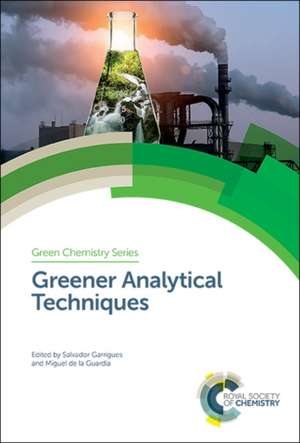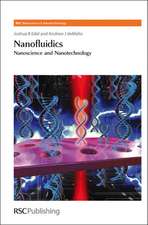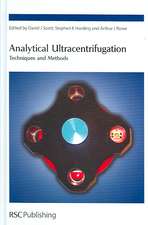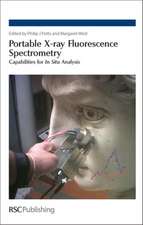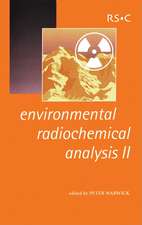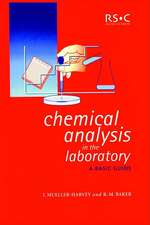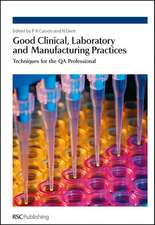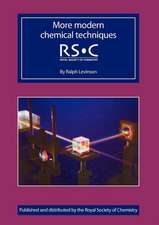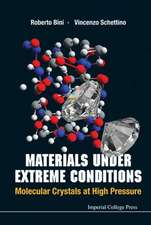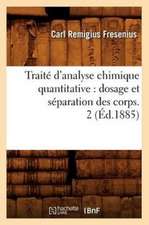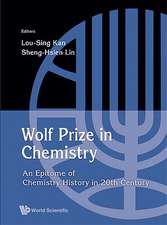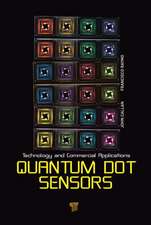Challenges in Green Analytical Chemistry: Green Chemistry Series
Editat de Salvador Garrigues, Miguel De La Guardiaen Limba Engleză Hardback – 13 mai 2020
Din seria Green Chemistry Series
- 14%
 Preț: 1151.69 lei
Preț: 1151.69 lei - 14%
 Preț: 1133.44 lei
Preț: 1133.44 lei - 14%
 Preț: 1387.98 lei
Preț: 1387.98 lei - 14%
 Preț: 1322.61 lei
Preț: 1322.61 lei - 14%
 Preț: 1228.89 lei
Preț: 1228.89 lei - 14%
 Preț: 1136.75 lei
Preț: 1136.75 lei - 14%
 Preț: 1128.47 lei
Preț: 1128.47 lei - 14%
 Preț: 1129.32 lei
Preț: 1129.32 lei - 9%
 Preț: 1170.57 lei
Preț: 1170.57 lei - 9%
 Preț: 1376.92 lei
Preț: 1376.92 lei - 34%
 Preț: 759.44 lei
Preț: 759.44 lei - 14%
 Preț: 1298.58 lei
Preț: 1298.58 lei - 14%
 Preț: 1381.12 lei
Preț: 1381.12 lei - 14%
 Preț: 1215.18 lei
Preț: 1215.18 lei - 14%
 Preț: 1211.02 lei
Preț: 1211.02 lei - 14%
 Preț: 1297.74 lei
Preț: 1297.74 lei - 14%
 Preț: 1383.57 lei
Preț: 1383.57 lei - 14%
 Preț: 1138.07 lei
Preț: 1138.07 lei - 9%
 Preț: 1033.15 lei
Preț: 1033.15 lei - 9%
 Preț: 1239.76 lei
Preț: 1239.76 lei - 9%
 Preț: 1033.59 lei
Preț: 1033.59 lei - 9%
 Preț: 1102.59 lei
Preț: 1102.59 lei - 9%
 Preț: 1031.88 lei
Preț: 1031.88 lei - 9%
 Preț: 1242.08 lei
Preț: 1242.08 lei - 9%
 Preț: 1172.06 lei
Preț: 1172.06 lei - 9%
 Preț: 1239.76 lei
Preț: 1239.76 lei - 9%
 Preț: 1170.97 lei
Preț: 1170.97 lei
Preț: 1170.97 lei
Preț vechi: 1286.78 lei
-9% Nou
Puncte Express: 1756
Preț estimativ în valută:
224.14€ • 243.54$ • 188.40£
224.14€ • 243.54$ • 188.40£
Carte indisponibilă temporar
Doresc să fiu notificat când acest titlu va fi disponibil:
Se trimite...
Preluare comenzi: 021 569.72.76
Specificații
ISBN-13: 9781788015370
ISBN-10: 1788015371
Pagini: 400
Dimensiuni: 158 x 236 x 28 mm
Greutate: 0.75 kg
Ediția:Nouă
Editura: RSC Publishing
Seria Green Chemistry Series
ISBN-10: 1788015371
Pagini: 400
Dimensiuni: 158 x 236 x 28 mm
Greutate: 0.75 kg
Ediția:Nouă
Editura: RSC Publishing
Seria Green Chemistry Series
Cuprins
Chapter 1: An ethical compromise and an economical opportunity; Chapter 2. Direct determination methods without sample preparation; Chapter 3: Replacement of hazardous solvents and reagents in analytical chemistry; Chapter 4. Green sample preparation methods; Chapter 5. Miniaturization of analytical methods; Chapter 6. Green analytical chemistry through flow analysis; Chapter 7. Green analytical separation methods; Chapter 8. Green electroanalysis; Chapter 9. Green Analytical Chemistry in the determination of organic pollutants in the environment; Chapter 10. On-line decontamination of analytical wastes; Subject Index
Notă biografică
Professor Miguel de la Guardia currently holds position as Professor of Analytical Chemistry in Valencia University (Spain). He received his MsSc from Valencia in 1976 and a PhD degree from the same university in 1979 with a thesis about "The use of emulsions in Atomic Spectroscopy". Promoted to Associate Professor in 1985, his current professorship started from 1991. During this time Professor Miguel de la Guardia have been member of a research team with a staff involving Prof. Agustin Pastor (Chromatography studies), Prof. M. Luisa Cervera (Atomic Spectrometry), Prof. Angel Morales (Automation and micro-wave assisted methodologies) and Prof. Salvador Garrigues (Vibrational Spectrometry) and many post-doctoral colleagues, friends and students who have cooperated for the publication of more than 400 research papers in international journals, from which 338 have been correctely included in the ISI web of Science His current research is focused on the automation of analytical methods through multicommutation, sample preparation procedures for both, elemental analysis and speciation, and for chromatography and spectrometry determinations and quantitative vibrational spectrometry in the FTIR, NIR and Raman fields. Other major topics of my research are Chemometrics, Development of green analytical methods and Development of portable spectrometers. Professor Miguel de la Guardia has also supervised 29 PhD thesis and participate in many analytical symposia through the world being invited speaker in France, Germany, Italy, Brazil, Venezuela, Morocco, Turkey, China, Norway, UK, USA, Colombia, Egypt, Uruguay, Argentina, Switzerland, Belgium. He is a member of the editorial board of Spectroscopy Letters (USA), Ciencia (Venezuela), J. Braz. Chem. Soc. (Brazil), having previously been member of the Advisory board of Analytica Chimica Acta from 1995 to 2000. He is currently a consultant of the government of Portugal, Italy, Argentina and China for the evaluation of research proposals and grants and is regularly requested by several journals to act as reviewer.
Textul de pe ultima copertă
Concerns about environmental pollution, global climate change and hazards to human health have increased dramatically. This has lead to a call for change in chemical processes including those that are part of chemical analysis. The development of analytical chemistry continues and every new discovery in chemistry, physics, molecular biology, and materials science brings new opportunities and challenges. Yet, contemporary analytical chemistry does not consume resources optimally. Indeed, the usage of toxic chemical compounds is at the highest rate ever. All this makes the emerging field of green chemistry a "hot topic" in industrial, governmental laboratories as well as in academia. This book starts by introducing the twelve principles of green chemistry. It then goes on to discuss how the principles of green chemistry can be used to assess the 'greenness' of analytical methodologies. The 'green profile' proposed by the ACS Green Chemistry Institute is also presented. A chapter on "Greening" sample preparation describes approaches to minimizing toxic solvent use, using non-toxic alternatives, and saving energy. The chapter on instrumental methods describes existing analytical approaches that are inherently green and making non-green methods greener. The final chapter on signal acquisition describes how quantitative structure-property relationship (QSPR) ideas could reduce experimental work thus making analysis greener. The book concludes with a discussion of how green chemistry is both possible and necessary. Green Analytical Chemistry is aimed at managers of analytical laboratories but will also interest teachers of analytical chemistry and green public policy makers.
Descriere
Descriere de la o altă ediție sau format:
Aimed at managers of analytical laboratories but will also interest teachers of analytical chemistry and green public policy makers this is a must for anyone working in or affiliated with Green Chemistry.
Aimed at managers of analytical laboratories but will also interest teachers of analytical chemistry and green public policy makers this is a must for anyone working in or affiliated with Green Chemistry.
